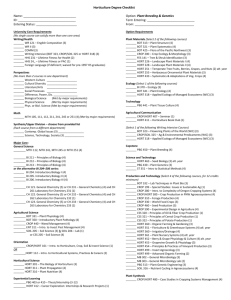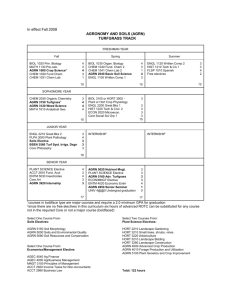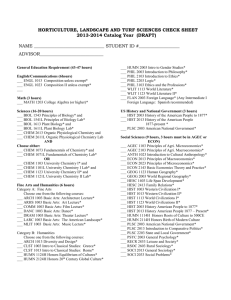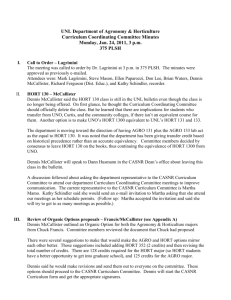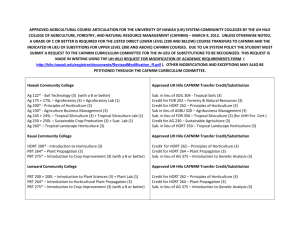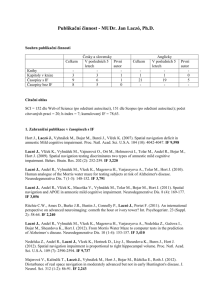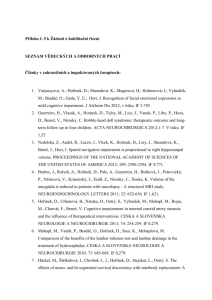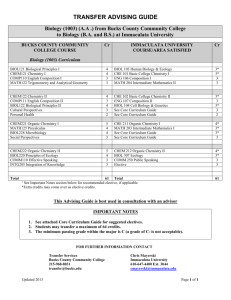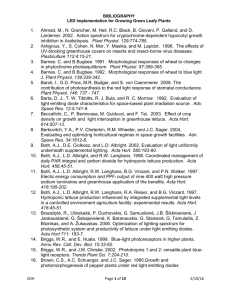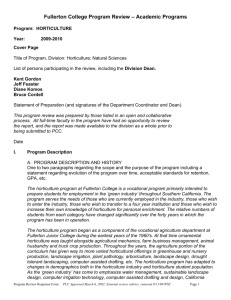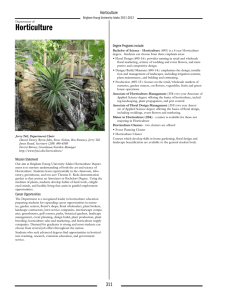Curriculum for Viticulture & Enology Option
advertisement
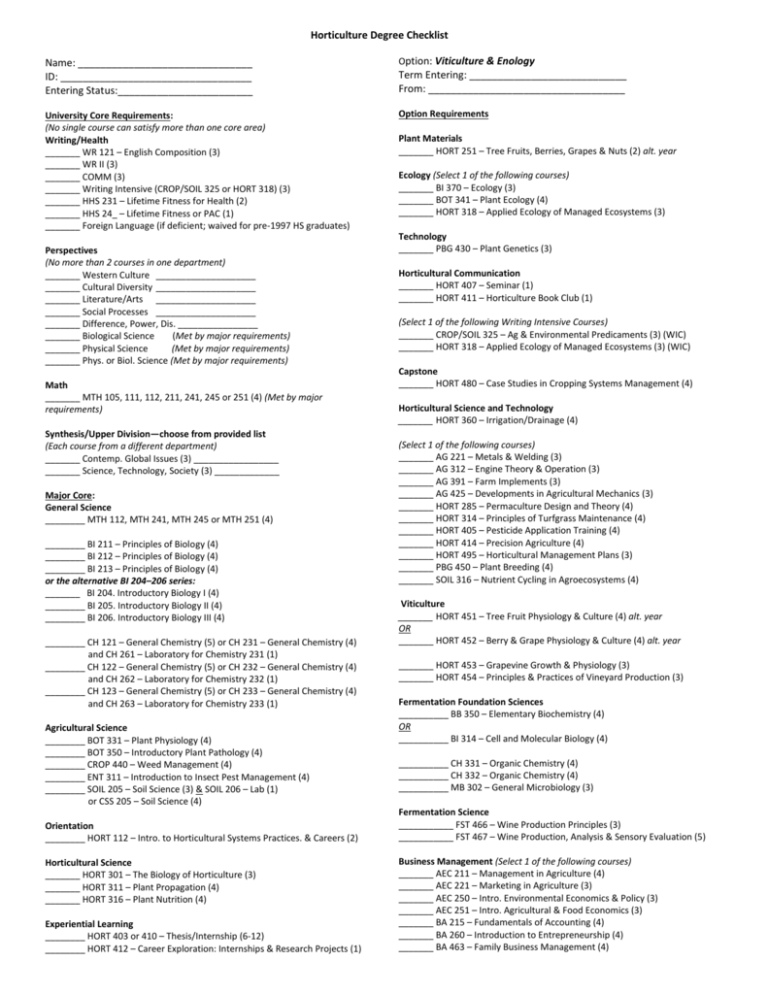
Horticulture Degree Checklist Name: _______________________________ ID: __________________________________ Entering Status:________________________ Option: Viticulture & Enology University Core Requirements: (No single course can satisfy more than one core area) Writing/Health _______ WR 121 – English Composition (3) _______ WR II (3) _______ COMM (3) _______ Writing Intensive (CROP/SOIL 325 or HORT 318) (3) _______ HHS 231 – Lifetime Fitness for Health (2) _______ HHS 24_ – Lifetime Fitness or PAC (1) _______ Foreign Language (if deficient; waived for pre-1997 HS graduates) Option Requirements Perspectives (No more than 2 courses in one department) _______ Western Culture ____________________ _______ Cultural Diversity ____________________ _______ Literature/Arts ____________________ _______ Social Processes ____________________ _______ Difference, Power, Dis. ________________ _______ Biological Science (Met by major requirements) _______ Physical Science (Met by major requirements) _______ Phys. or Biol. Science (Met by major requirements) Math _______ MTH 105, 111, 112, 211, 241, 245 or 251 (4) (Met by major requirements) Synthesis/Upper Division—choose from provided list (Each course from a different department) _______ Contemp. Global Issues (3) _________________ _______ Science, Technology, Society (3) _____________ Major Core: General Science ________ MTH 112, MTH 241, MTH 245 or MTH 251 (4) ________ BI 211 – Principles of Biology (4) ________ BI 212 – Principles of Biology (4) ________ BI 213 – Principles of Biology (4) or the alternative BI 204–206 series: _______ BI 204. Introductory Biology I (4) ________ BI 205. Introductory Biology II (4) ________ BI 206. Introductory Biology III (4) ________ CH 121 – General Chemistry (5) or CH 231 – General Chemistry (4) and CH 261 – Laboratory for Chemistry 231 (1) ________ CH 122 – General Chemistry (5) or CH 232 – General Chemistry (4) and CH 262 – Laboratory for Chemistry 232 (1) ________ CH 123 – General Chemistry (5) or CH 233 – General Chemistry (4) and CH 263 – Laboratory for Chemistry 233 (1) Agricultural Science ________ BOT 331 – Plant Physiology (4) ________ BOT 350 – Introductory Plant Pathology (4) ________ CROP 440 – Weed Management (4) ________ ENT 311 – Introduction to Insect Pest Management (4) ________ SOIL 205 – Soil Science (3) & SOIL 206 – Lab (1) or CSS 205 – Soil Science (4) Orientation ________ HORT 112 – Intro. to Horticultural Systems Practices. & Careers (2) Horticultural Science _______ HORT 301 – The Biology of Horticulture (3) _______ HORT 311 – Plant Propagation (4) _______ HORT 316 – Plant Nutrition (4) Experiential Learning ________ HORT 403 or 410 – Thesis/Internship (6-12) ________ HORT 412 – Career Exploration: Internships & Research Projects (1) Term Entering: ____________________________ From: ___________________________________ Plant Materials _______ HORT 251 – Tree Fruits, Berries, Grapes & Nuts (2) alt. year Ecology (Select 1 of the following courses) _______ BI 370 – Ecology (3) _______ BOT 341 – Plant Ecology (4) _______ HORT 318 – Applied Ecology of Managed Ecosystems (3) Technology _______ PBG 430 – Plant Genetics (3) Horticultural Communication _______ HORT 407 – Seminar (1) _______ HORT 411 – Horticulture Book Club (1) (Select 1 of the following Writing Intensive Courses) _______ CROP/SOIL 325 – Ag & Environmental Predicaments (3) (WIC) _______ HORT 318 – Applied Ecology of Managed Ecosystems (3) (WIC) Capstone _______ HORT 480 – Case Studies in Cropping Systems Management (4) Horticultural Science and Technology _______ HORT 360 – Irrigation/Drainage (4) (Select 1 of the following courses) _______ AG 221 – Metals & Welding (3) _______ AG 312 – Engine Theory & Operation (3) _______ AG 391 – Farm Implements (3) _______ AG 425 – Developments in Agricultural Mechanics (3) _______ HORT 285 – Permaculture Design and Theory (4) _______ HORT 314 – Principles of Turfgrass Maintenance (4) _______ HORT 405 – Pesticide Application Training (4) _______ HORT 414 – Precision Agriculture (4) _______ HORT 495 – Horticultural Management Plans (3) _______ PBG 450 – Plant Breeding (4) _______ SOIL 316 – Nutrient Cycling in Agroecosystems (4) Viticulture _______ HORT 451 – Tree Fruit Physiology & Culture (4) alt. year OR _______ HORT 452 – Berry & Grape Physiology & Culture (4) alt. year _______ HORT 453 – Grapevine Growth & Physiology (3) _______ HORT 454 – Principles & Practices of Vineyard Production (3) Fermentation Foundation Sciences __________ BB 350 – Elementary Biochemistry (4) OR __________ BI 314 – Cell and Molecular Biology (4) __________ CH 331 – Organic Chemistry (4) __________ CH 332 – Organic Chemistry (4) __________ MB 302 – General Microbiology (3) Fermentation Science ___________ FST 466 – Wine Production Principles (3) ___________ FST 467 – Wine Production, Analysis & Sensory Evaluation (5) Business Management (Select 1 of the following courses) _______ AEC 211 – Management in Agriculture (4) _______ AEC 221 – Marketing in Agriculture (3) _______ AEC 250 – Intro. Environmental Economics & Policy (3) _______ AEC 251 – Intro. Agricultural & Food Economics (3) _______ BA 215 – Fundamentals of Accounting (4) _______ BA 260 – Introduction to Entrepreneurship (4) _______ BA 463 – Family Business Management (4) Ecology & Sustainability Ecosystems Courses (Meets Synthesis Requirements) (Each course must be from a different department) Contemporary Global Issues (Select 1 of the following courses) _______ AEC 351 – Natural Resource Economics & Policy (3) _______ AEC 352 – Environmental Economics and Policy (3) _______ BI 301 – Human Impacts on Ecosystems (3) _______ BI 306 – Environmental Ecology (3) _______ CROP 330 – World Food Crops (3) _______ ENT/HORT 331 – Pollinators in Peril (3) _______ FES 365 – Issues in Natural Resources Conservation (3) _______ FW 325 – Global Crises in Resource Ecology (3) _______ GEO 300 – Sustainability for the Common Good (3) _______ GEO 330 – Geography International Development & Globalization (3) _______ SUS 350 – Sustainable Communities (4) _______ Z 349 – Biodiversity: Causes, Consequences & Conservation (3) Science, Technology and Society (Select 1 of the following courses) _______ ANS 315 – Contentious Social Issues in Animal Agriculture (3) _______ ANS/FES/FW 485 – Consensus and Natural Resources (3) _______ ATS 320 – The Changing Climate (3) _______ BI 348 – Human Ecology (3) _______ BI/FES 435 – Genes and Chemicals in Agriculture: Value and Risk (3) _______ BOT 324 – Fungi in Society (3) _______ CH 374 – Technology, Energy, and Risk (3) _______ ENGR 350 – Sustainable Engineering (3) _______ ENGR 363 – Energy Matters (3) _______ ENSC 479 – Environmental Case Studies (3) _______ ENT/BI 300/HORT 330 – Plagues, Pests and Politics (3) _______ FES/NR/RNG 477 – Agroforestry (3) _______ FST 421 – Food Law (3) _______ FW 485 – Consensus & Natural Resources (3) _______ GEO 300 – Sustainability for the Common Good (3) _______ GEO/SOIL 335 – Introduction to Water Science and Policy (3) _______ HST 481 – Environmental History of the United States (4) _______ HSTS 421 – Technology & Change (4) _______ HSTS 470 – Ecology & History: Landscapes Columbia Basin (3) _______ NUTR 312 – Issues in Nutrition & Health (3) _______ PH 313 – Energy Alternatives (3) _______ PHL 325 – Scientific Reasoning (4) _______ PS 476 – Science & Politics (4) _______ SOIL 395 – World Soil Resources (3) _______ SUS 304 – Sustainability Assessment (4) Total Units (need 180) __________ Upper Div. Units (need 60) _______ Research Track (Optional) _______ HORT 406 – Projects: Data Presentations (1) _______ MTH 251 – Differential Calculus (4) _______ MTH 252 – Integral Calculus (4) _______ ST 351 – Intro to Statistical Methods (4) (Select 3 of the following) _______ BB 350 – Elementary Biochemistry (4) _______ BI 370 – Ecology (3) _______ BOT 341 – Plant Ecology (4) _______ CH 331 – Organic Chemistry (4) _______ CH 332 – Organic Chemistry (4) _______ CH 337 – Organic Chemistry Lab (4) _______ MB 230 – Introductory Microbiology (4) _______ PH 201 – General Physics (5) _______ PH 202 – General Physics (5) Grade Requirements Students pursuing a major or minor in horticulture are required to receive a grade of C– or better in all HORT (horticulture) and PBG (plant breeding and genetics) courses that are required for completion of their major and option, or minor. If a grade below C– is received in a HORT or PBG course required for their major and option, or minor, a student will need to retake the course and receive a grade of C– or better. If the grade below a C– was received for a course that is part of a group of courses where the student can select which courses to take (i.e., they do not need to take all of the courses, just a specified number of courses or credits) then it would be acceptable for the student to substitute a course for the one that they had received a grade below a C–. For example, in most of our options, a student needs to complete three of four plant identification courses. If a student received a grade lower than a C– in one of the classes, they could either retake the same course or complete the other three courses with a grade of C– or better.
